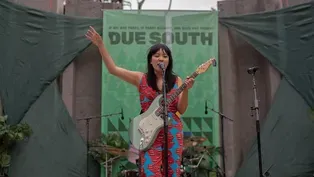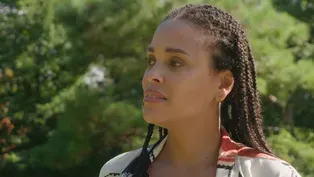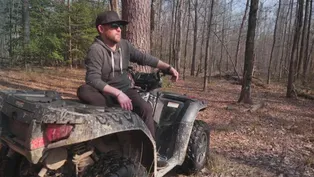
Natasha Trethewey Returns to New Orleans
Clip: Episode 3 | 2m 31sVideo has Closed Captions
Pulitzer Prize winner Natasha Trethewey returns to New Orleans.
Pulitzer Prize winner Natasha Trethewey's book of poetry "Monument" is creative defiance against cultural erasure in the face of white supremacy. Trethewey returns to New Orleans where the removal of Confederate monuments begs the question, "What was there?"

Natasha Trethewey Returns to New Orleans
Clip: Episode 3 | 2m 31sVideo has Closed Captions
Pulitzer Prize winner Natasha Trethewey's book of poetry "Monument" is creative defiance against cultural erasure in the face of white supremacy. Trethewey returns to New Orleans where the removal of Confederate monuments begs the question, "What was there?"
How to Watch Southern Storytellers
Southern Storytellers is available to stream on pbs.org and the free PBS App, available on iPhone, Apple TV, Android TV, Android smartphones, Amazon Fire TV, Amazon Fire Tablet, Roku, Samsung Smart TV, and Vizio.
Buy Now

More from Southern Storytellers
We're highlighting the music, literary, and film creators featured in the show. Explore the recommended reading list, the Southern Storytellers Spotify playlist, and more.Providing Support for PBS.org
Learn Moreabout PBS online sponsorship[pensive music] ♪ ♪ ♪ ♪ ♪ ♪ ♪ ♪ - I think what's interesting to me now about seeing this plinth where the monument used to be, is the way that it enacts a kind of erasure of the hundreds of monuments North and South commemorating the Civil War.
So now that they've come down and are coming down in so many places, we see almost a wound, a scar, an absence where those things were once inscribed.
I think that it might make people ask questions that allow us to tell a fuller version of our American history.
To see it and to see something gone is to ask what was there.
♪ ♪ "Here, too, for the Confederacy, an obelisk oblivious in its name, a word that also meant the symbol to denote in ancient manuscripts, the spurious, corrupt, or doubtful.
At its base forged in concrete, a narrative of valor, virtue, states' rights.
Here it is only the history of a word, obelisk, that points us toward what's not there, all of it palimpsest, each mute object repeating a single refrain.
Remember this."
Video has Closed Captions
The series continues as Southern creators take us home to the places that define them. (30s)
Jesmyn Ward Reads From Her Memoir 'Men We Reaped'
Video has Closed Captions
Two-time National Book Award winner Jesmyn Ward reads from her memoir "Men We Reaped." (2m 13s)
Justin Moore Discusses the Inspiration for His Songwriting
Video has Closed Captions
Justin Moore shows us the land he grew up on and remembers his grandfather. (1m 13s)
Providing Support for PBS.org
Learn Moreabout PBS online sponsorship













